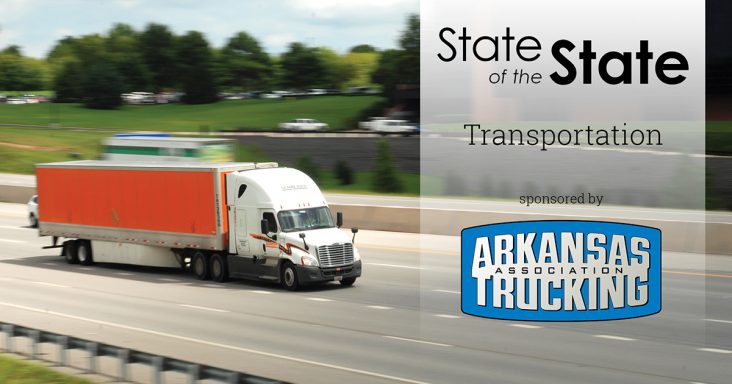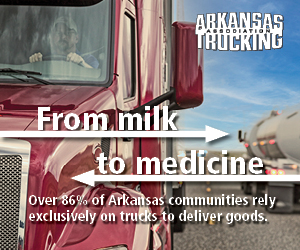2021 should be better year for trucking industry
by January 13, 2021 3:22 pm 2,728 views

The trucking industry will have no shortage of challenges in 2021 as it delivers the COVID-19 vaccines that are expected to lead to some sense of American normalcy.
Shannon Newton, president of the Arkansas Trucking Association, said truck drivers deliver the goods that help communities recover after storms and natural disasters. Amid the COVID-19 pandemic, she said the industry delivered the goods people needed to shelter in place.
“With a vaccine ready, trucking is delivering what we need to be able to safely leave our homes again,” Newton added. “I’m looking forward to a new understanding and appreciation of the trucks beside us on the highway.”
Doug Voss, the Scott E. Bennett Arkansas Highway Commission Endowed Chair at the University of Central Arkansas, foresees 2021 as a good year for carriers amid high freight rates. Spot rates in 2020 sometimes were higher than 2018 levels. Compared to 2019, diesel prices declined by about 18%, while revenue per shipment increased by about 0.6%. But rising insurance costs and driver wages have cut into earnings, he noted.
“Overall, I think 2021 will be a better year than 2020 for trucking,” Voss said. “We’re sitting here looking at all really good indicators.”
While there hasn’t been a perfect year for trucking — with the good often offsetting the bad — he said carriers will have to increase driver pay and attract more good drivers. At the start of the pandemic, freight demand fell, especially for carriers serving the automotive industry. Demand, however, was strong for those hauling goods for retailers.
“We’ve seen what I would characterize as a V-shaped recovery,” Voss said. “Those that were down really didn’t stay down for long.”
 The challenge has been how to ramp operations amid rising freight demand, he said. E-commerce freight volumes have risen, and labor issues have led to more shipments needing to be expedited, resulting in greater freight demand. And this has been favorable for the trucking industry. Donnie Williams, executive director of the Supply Chain Management Research Center at the University of Arkansas, said those hauling essential goods fared better than others, and in 2021, he doesn’t expect demand to fall for essentials, such as disinfectants.
The challenge has been how to ramp operations amid rising freight demand, he said. E-commerce freight volumes have risen, and labor issues have led to more shipments needing to be expedited, resulting in greater freight demand. And this has been favorable for the trucking industry. Donnie Williams, executive director of the Supply Chain Management Research Center at the University of Arkansas, said those hauling essential goods fared better than others, and in 2021, he doesn’t expect demand to fall for essentials, such as disinfectants.
“It’s been really fragmented depending on the type of product and the type of services that you were providing across the market,” Williams said, adding that economists project an economic slowdown in early 2021 because of rising COVID rates. And even with the vaccine, he said it will be “a slow rollout across the country.”
From a supply side, a driver shortage persists, and the pandemic has contributed to more driver retirements, Voss said. Attracting new drivers has been difficult with truck driving schools operating at about half capacity because of COVID-related constraints. Also, the Drug and Alcohol Clearinghouse, which started in 2020, has led to nearly 40,000 fewer drivers in the workforce, said Voss, adding that he hopes they aren’t working but seeking treatment to return to work. The construction industry also attracts drivers from the trucking industry.
Voss said carriers would like to buy more trucks to haul more freight, but without more drivers, there’s no need to purchase additional trucks. The driver shortage was the top industry issue for the fourth consecutive year in 2020, according to American Transportation Research Institute (ATRI), and Voss, who was named to ATRI’s 2021-2022 Research Advisory Committee, said finding drivers will be the top challenge in 2021.
The rising cost of insurance is another industry challenge amid an increase in nuclear verdicts. The high cost has led to fewer insurance carriers serving the industry and to small- and medium-sized trucking companies going out of business. Voss said high freight rates should limit the number of these companies going out of business. The Arkansas Trucking Association will focus on the rising cost of insurance and the driver shortage, said Newton, adding that it also will continue to be a resource for COVID policies and information.
Throughout 2021, Voss expects temperature-controlled carriers to have a role in the delivery of COVID vaccines with their need to be kept at a specific temperature. Williams highlighted the role parcel carriers will have in vaccine shipments and noted that UPS has developed its own dry ice to maintain each vaccine’s required temperature. Newton noted the vaccine delivery will highlight the issues with existing roads, bridges and airports, and she is hopeful a long-term infrastructure bill will be a top priority for the next administration.
“Transportation and infrastructure aren’t red or blue issues — these are the things that impact everyone, every day,” Newton said. “We are seeing some familiar names from the Obama White House, and are hopeful to work together on other issues like drug testing, safety initiatives, as well as insurance and climate policy.”
